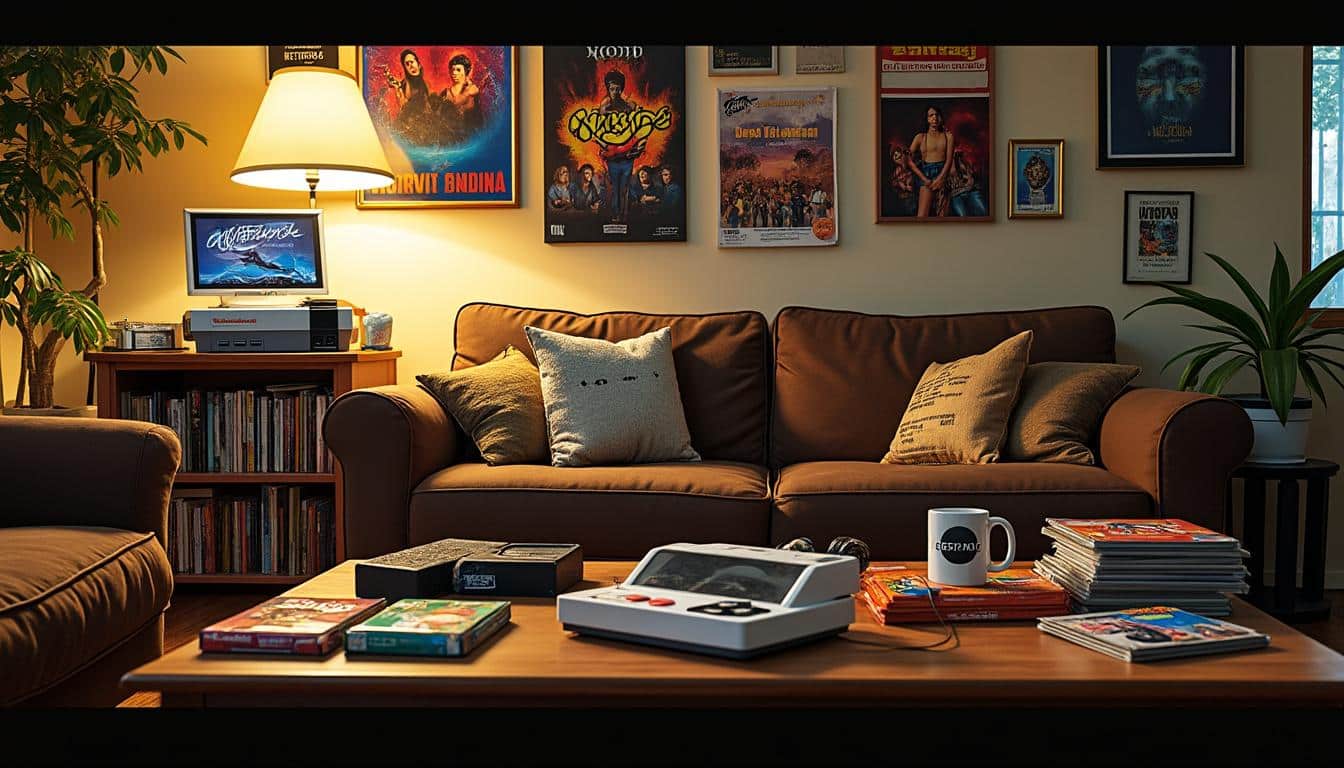Childhood memories possess an incredible power. They take us back to moments of pure simplicity and joy. For Millennials, this nostalgia is a true source of comfort.
By revisiting TV shows from the 90s or listening to hits from that era, emotion and familiarity play an essential role. The rapid technology and constant cultural changes make these memories all the more precious. In a world where everything evolves at a breakneck speed, turning to the past offers emotional stability. It’s a way to reconnect with oneself and manage the stress of everyday life.
Nostalgia particularly affects Millennials due to the profound technological and cultural changes they have experienced. Being the first generation to grow up with the rise of the Internet and social media, Millennials have witnessed a rapid transition to an increasingly digital world, which creates a marked contrast with their childhood memories.
Furthermore, Millennials have witnessed major geopolitical events such as the September 11 attacks and the Great Recession, which have shaped their worldview and heightened their sensitivity to stress and burnout. Nostalgia provides them with an emotional refuge, allowing them to return to a time perceived as simpler and less stressful. The TV shows of the 90s, the music of that decade, and other cultural elements serve as a link to moments of safety and comfort.
Finally, as a generation in the midst of the digital life cycle, Millennials use nostalgia to reconnect with their identity before contemporary pressures alter their well-being. This allows them to find emotional balance and rediscover aspects of their personality that may have been lost in the hectic pace of modern life.

Nostalgia is a powerful phenomenon that influences many generations, but it seems to have a particularly strong impact on Millennials. This generation, born between 1981 and 1996, grew up during a time of rapid technological and social changes. Understanding why nostalgia resonates so much with them requires an exploration of the various cultural and psychological aspects that shape their life experience. By turning to the past, Millennials find refuge in memories that remind them of simpler and more stable times. This article delves deeply into the multiple reasons that explain this trend, relying on concrete data and relevant examples.
Rapid Technological Evolution
Millennials have been direct witnesses of the breathtaking technological evolution. From the era of VHS and landline telephones to the advent of high-speed Internet and smartphones, this generation has experienced a major transition. This dual exposure allows them to compare the old times with the digital present, thus reinforcing their sense of nostalgia. For example, memorizing phone numbers or creating playlists on CDs are practices that are now outdated but cherished. This juxtaposition between two worlds creates a desire to return to a time perceived as more authentic and less stressful. Additionally, Millennials often seek to regain this lost simplicity by incorporating retro elements into their daily lives, such as the resurgence of Vinyl records or classic video games.
Impact of Global Events
Millennials grew up during periods marked by significant global events such as the September 11 attacks, the Great Recession, and the rapid rise of social media. These experiences have influenced their worldview and their perception of stability. Nostalgia becomes an adaptation mechanism, offering a way to reconnect with moments when things seemed more predictable and controlled. For instance, revisiting TV shows like Full House evokes a time when problems seemed simpler and relationships clearer. This quest for comfort in the face of current uncertainty strengthens the attraction to positive memories from the past.
Overwork and Burnout
The Millennial generation is often referred to as the “burnout generation” due to high-stress levels related to work, student debts, and the incessant quest for work-life balance. Resorting to nostalgia serves as a safety valve, allowing them to temporarily escape current pressures. Watching comforting shows like Boy Meets World or listening to 90s hits provides a much-needed break and helps to reduce stress levels. Studies show that 66% of Millennials report high levels of burnout, which drives this generation to seek effective ways to unwind and recharge by immersing themselves in positive memories.
Reminder of a Lost Innocence
Nostalgia allows Millennials to reconnect with a time in their life marked by innocence and fewer responsibilities. This return to the past is often associated with childhood memories where the biggest worries were simple, like finishing homework or playing outside until sunset. This retrospection is beneficial for mental health, offering a sense of stability and security. Moreover, studies like those by Dr. Krystine Batcho show that nostalgia helps recall who we were and how we have evolved, thereby strengthening our personal identity.
Influence of Popular Culture
The popular culture of the 90s plays a key role in the nostalgia of Millennials. Iconic TV series, such as Friends or Full House, as well as music from groups like the Backstreet Boys, are recurring elements that fuel this nostalgic feeling. These cultural references serve as a connection point between personal memories and collective trends, creating a sense of community and sharing. Additionally, platforms like YouTube and Netflix facilitate access to this retro content, allowing Millennials to easily revisit their cultural past and share it with younger generations.
Search for Meaning and Identity
At an age where Millennials often seek to define their identity and place in the world, nostalgia can provide solid reference points. Diving back into childhood or adolescence memories helps to define who they are today in contrast to who they were. This search for authenticity is supported by resources like the true generations quiz that allow individuals to better understand their generational identity and unique personality traits. By exploring their past, Millennials can better navigate their present and envision their future with an enriched perspective.
Adaptation to Social Changes
Millennials are also facing rapid social changes, such as the evolution of gender roles, the rise of social movements, and transformations in family structures. Nostalgia offers a way to anchor amidst these transformations by focusing on familiar values and traditions. For instance, revisiting classic commercials or types of father figures on television from the past, as described in The 16 Types of Classic Television Fathers, can provide a sense of continuity and stability in a constantly evolving world.
Nostalgic Media Consumption and Marketing
Nostalgic marketing plays a crucial role in the way Millennials consume media. Companies exploit this tendency by relaunching retro products, reissuing popular series, and using advertising campaigns that evoke the 90s. For instance, brands like Nintendo have re-released classic consoles, and platforms like Spotify offer playlists dedicated to 90s hits. This marketing strategy reinforces the emotional connection of Millennials with their past, encouraging them to invest more in products and experiences that evoke pleasant memories.
Nostalgia among Millennials is the result of a complex combination of technological, social, and psychological factors. By turning to the past, this generation finds refuge in the face of contemporary challenges and renews its sense of identity and community. Whether through popular culture, personal reflection, or targeted marketing, nostalgia plays an essential role in how Millennials navigate an ever-evolving world. Understanding these dynamics can help better comprehend the needs and aspirations of this unique generation.

“`html
FAQ
Q : Why does nostalgia particularly affect Millennials?
A : Millennials have experienced a period of rapid technological and cultural changes. Nostalgia allows them to reconnect with simpler times and regain a sense of stability in the face of contemporary challenges such as burnout and anxiety.
Q : How has technology influenced nostalgia among Millennials?
A : As the first generation to grow up with rapid technological evolution, Millennials have a unique connection to both the digital world and pre-digital experiences. This duality drives them to seek memories from a time when life seemed less complex and more tangible.
Q : What role does nostalgia play in stress management and burnout among Millennials?
A : Nostalgia serves as a coping mechanism, providing an emotional refuge against constant stress and pressures of modern life. Watching familiar TV shows or listening to retro music allows Millennials to relax and find a sense of comfort.
Q : How do shared experiences among Millennials strengthen their attachment to nostalgia?
A : Millennials share common memories related to major events and cultural phenomena, which reinforces their sense of belonging and desire to relive those moments through nostalgia.
Q : Do other generations also experience nostalgia in a similar way?
A : While every generation may feel nostalgia, Millennials experience it uniquely due to the technological and economic upheavals specific to their time. For example, Generation X often reminisces about the freedom and independence of their youth, while Generation Z has never known a world without the internet.
Q : What types of nostalgic media are most popular among Millennials?
A : Millennials particularly enjoy 90s TV shows, retro music, and films that remind them of their childhood and adolescence, such as “Full House” or “Friends.” These media provide them with a sense of comfort and familiarity.
Q : How does nostalgia help Millennials reconnect with their personal identity?
A : By revisiting memories from the past, Millennials can better understand who they were and how they have evolved. This helps them rediscover aspects of their identity that may have been forgotten or set aside due to current challenges.











